Doing Good, Doing Well

Doing Good, Doing Well
Celebrating 10 years of Farrell Hall
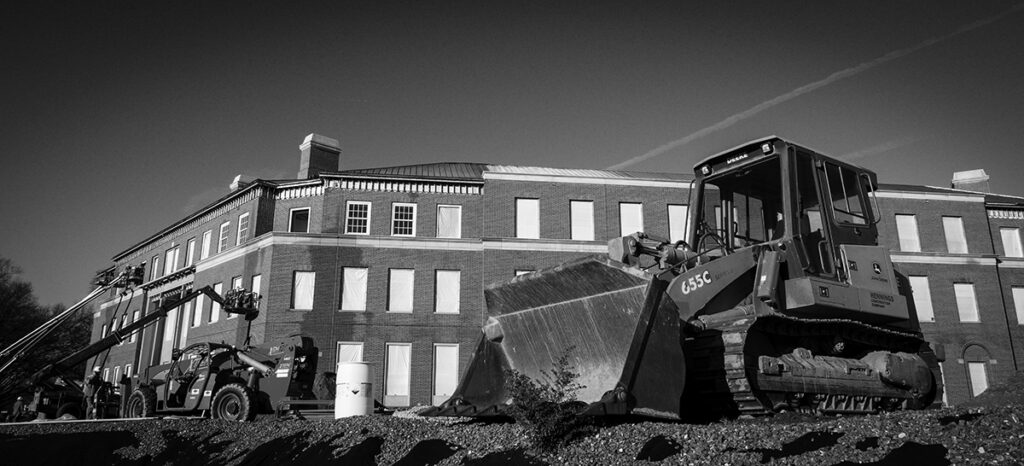

On the northside of Wake Forest’s campus, red clay was piled high, bulldozers hummed along the horizon and hammers beat out an unscripted, yet syncopated, rhythm. Jim Parham, the general contractor and overall conductor of this symphony, was preparing for the question that he received regularly when Mike Farrell (P ’10, LLD ’13) visited campus. “Jim, how many families are we feeding today?” asked the Wake Forest Trustee, parent and benefactor.
Parham would tally up the number of local construction workers investing their time and talent to construct Farrell Hall. Upon hearing the answer, Mike would offer a slight nod, a small smile or a quiet, “good, good.”
Feeding families was important to Mike. He was the founder, chairman, CEO and president of Annaly Capital Management – the largest residential mortgage real estate investment trust listed on the New York Stock Exchange at the time. But he was still the humble son of a blue collar Irishman who knew the challenges of war, an economic depression and emigrating to the United States. For years, Mike’s family ate because his father went to heights and depths to make it happen. He climbed scaffolding to waterproof and caulk skyscrapers in Manhattan. When vertigo ended that opportunity, he went underneath the city to paint subway cars for the New York City Transit Authority. And then, he found his favorite job: serving as a janitor at an elementary school in New Jersey. Now, Mike was in a place to make sure others could provide for their families and contribute to the life of their community. It’s what drove him to be a good leader, to approach business with integrity, to be a forward thinker and to create opportunities for others to thrive. That’s why Mike and his wife, Mary, now a University Trustee, partnered with Wake Forest to create a building that would be home to future business leaders who would approach their work with thoughtfulness and a spirit of Pro Humanitate. Students at Wake Forest would learn how they could use business to improve their communities. To better the world.
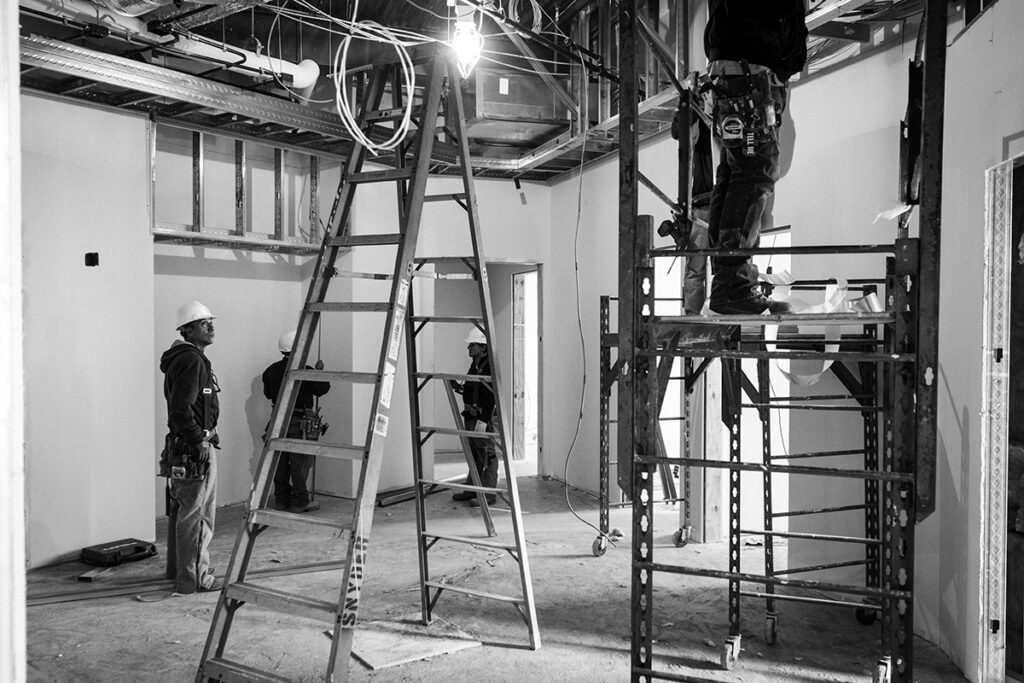
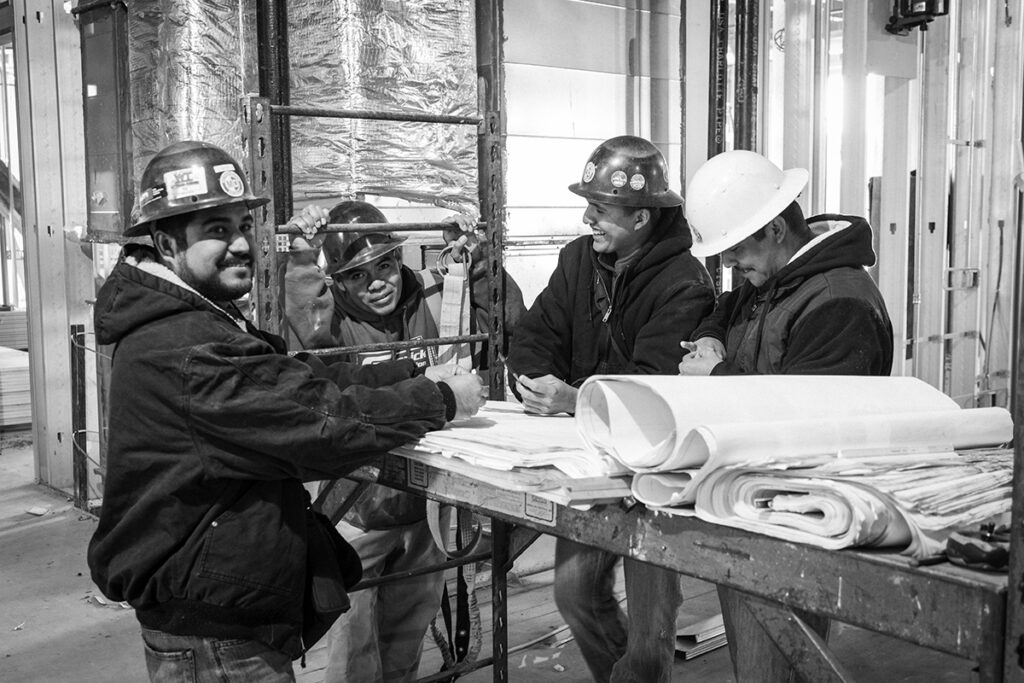

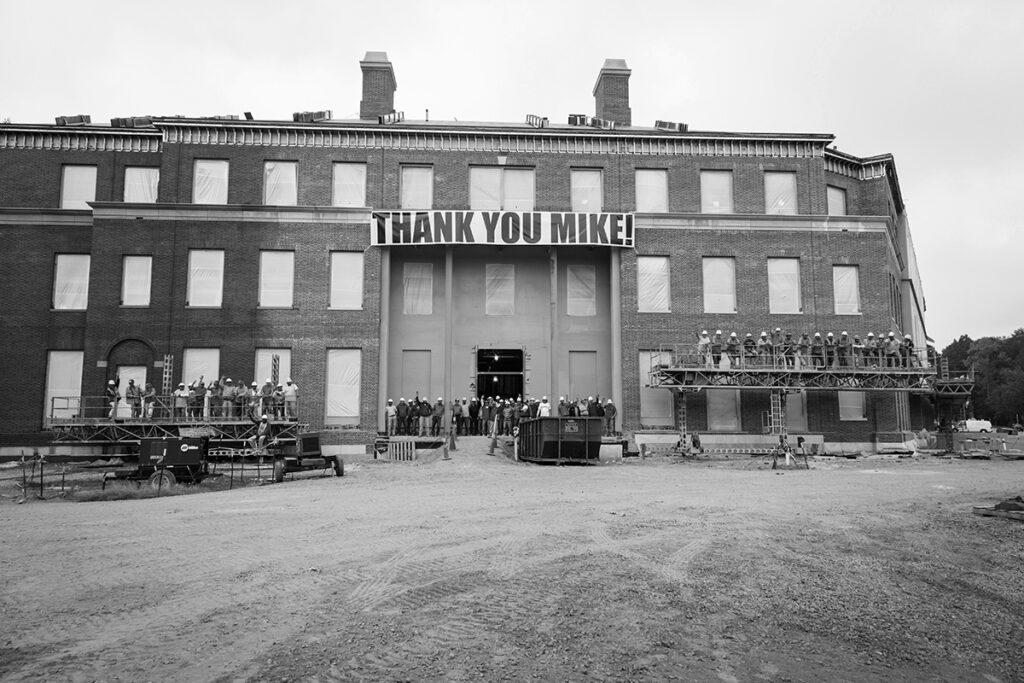
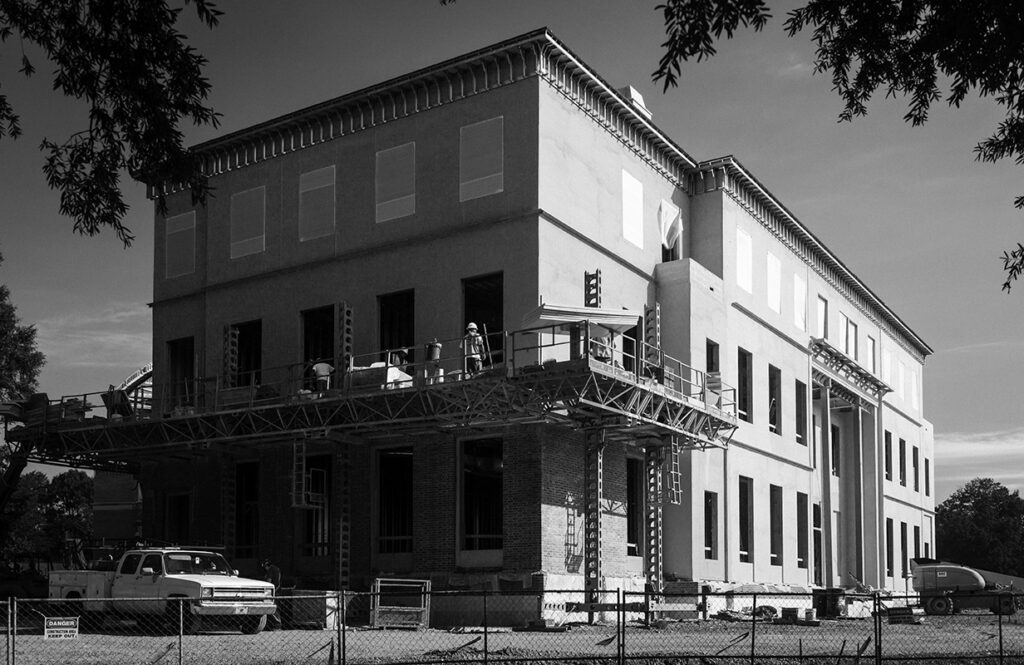


Determination and a Dream
The story of Farrell Hall isn’t that Wake Forest built a new building for the school of business. The story of Farrell Hall is that when circumstances look bleak, there is no stopping a determined group of people from pointing their eyes toward the future with hope and joining together to achieve more than any of them could have imagined or done alone.
“Great things are possible with determination and a dream,” Mike said. And he meant it.
In 2008, as the economy was in a recession, there was not much optimism in dreaming about raising money for new facilities. But at a dinner in Manhattan, all that changed. Surrounded by the skyline that had been waterproofed and caulked by the help of Mike’s father, the Farrells offered a gift of $10 million to provide a home for business education at Wake Forest.
“Great things are possible with determination and a dream.”
– Mike Farrell (P ’10, LLD ’13)
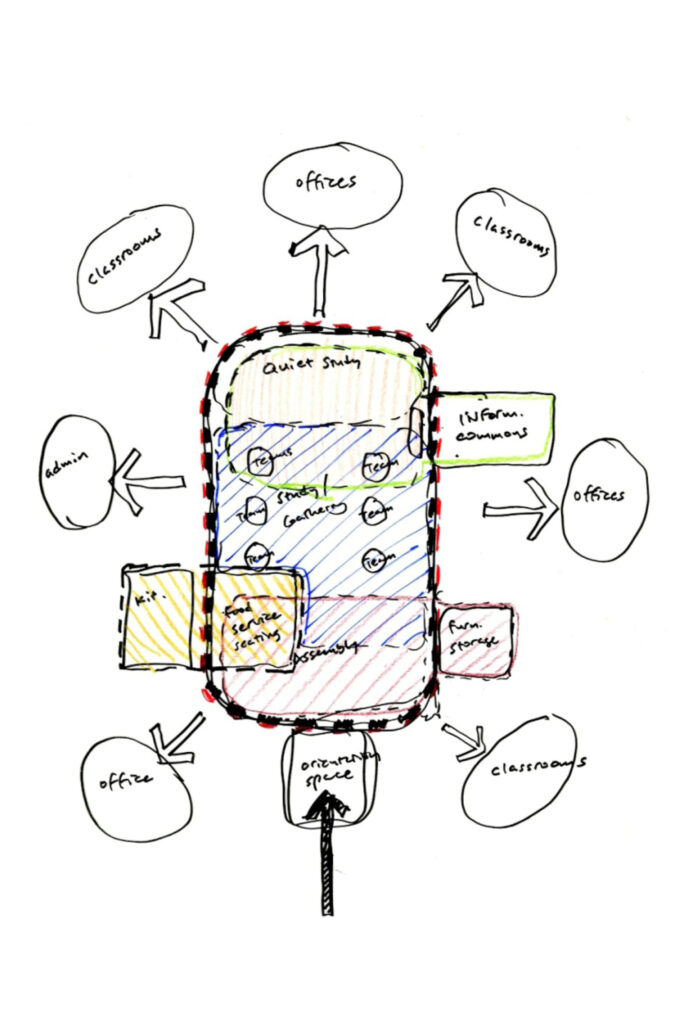
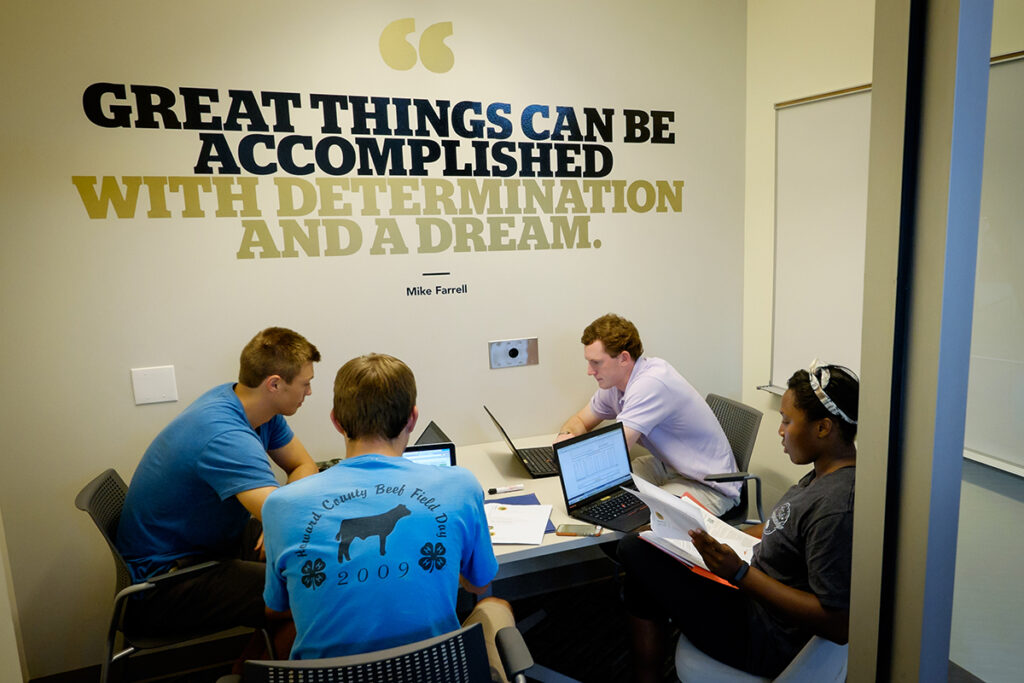
“The Empire State Building, the Rockefeller Center – these things were built during the Depression when people didn’t think they were achievable,” Mike said. “When people are confused and scared and concerned about direction, you need to send a strong message that we can’t stop thinking about the future … We need to make sure we have the right leaders in place, and places like Wake create those leaders.”
That entrepreneurial and philanthropic spirit caught hold and spread. The Farrells’ commitment led other leaders within the Wake Forest community to join in the effort. A small group of business school alumni rallied around then-Dean Steve Reinemund, former CEO of PepsiCo, and the Wake Forest faculty to imagine how collectively they could transform business education.
A napkin sketch from the earliest conversations shows the fundamental idea for the building. Situated in the middle of the building was a living room – a central place for connection and collaboration for students and faculty. Radiating from that center were offices, classrooms, study spaces, administrative areas and gathering places. Active conversation and exchange of ideas was the breath that would flow through the entire building.
Providing an intentional place for interaction and connection was critical to the kind of education Wake Forest was pursuing. The intention of the building’s design was that students and faculty could have space to be together to engage in that coincidental collaboration that so often is the catalyst for great ideas and to build the meaningful relationships with one another that characterize the Wake Forest experience.
“At Wake Forest, business education is defined by the relationships with professors,” said University Trustee Candy Ergen (P ’12, P ’17), who along with her husband, Charlie (MBA ’76, LLD ’12, P ’12, P ’17), named the Bern Beatty Colloquium after the professor who made it possible for Charlie to receive a scholarship to attend Wake Forest. “What we wanted most was for generations of students to have a deep connection with faculty. We also wanted this space to be the University’s living room – a place where students across campus could come and be inspired.”
Now, 10 years later, the living room is fulfilling the very idea of the founders. Nearly half of the students who gather in Farrell Hall are non-business students. On any given day, you will see a group of students sitting in a gathering place by the tall windows, bent over laptops, strategizing their next steps for their group project. Seated on a couch in the middle of the room is an undergraduate student, reading a textbook with her highlighter poised to capture the most important ideas. A prospective student-athlete is being given a tour by the football coach. Walking down the staircase are two faculty members talking as they head to refill their coffee mugs. At another table is a professor deep in conversation with a group of students wrestling with a concept they talked about earlier in class. The provost is sitting at a high table with a student discussing the future. And outside, around the firepit, nearly every seating area is taken, including one with a group of faculty members in rocking chairs testing their ideas with one another.
Compare the images of Farrell Hall by moving the slider (click or swipe).
A Question of Character
The Farrells first became aware of Wake Forest when their son, Michael (’10), now a member of the Emerging Leaders Board, enrolled as a student. They were attracted to the University’s mission to educate the whole person.
“We went there looking for academics,” Mike said in 2011, “and we found a place where there was a discussion about community service, faith, academics.”
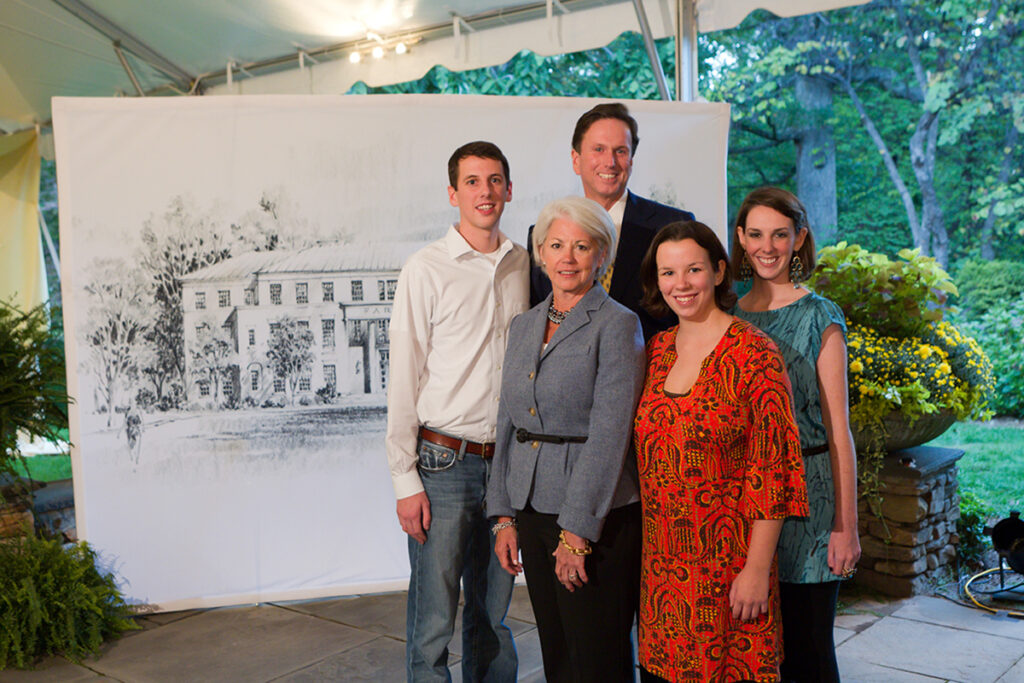
“He was a man deeply committed to doing things right.”
– Nathan Hatch (LHD ’21)
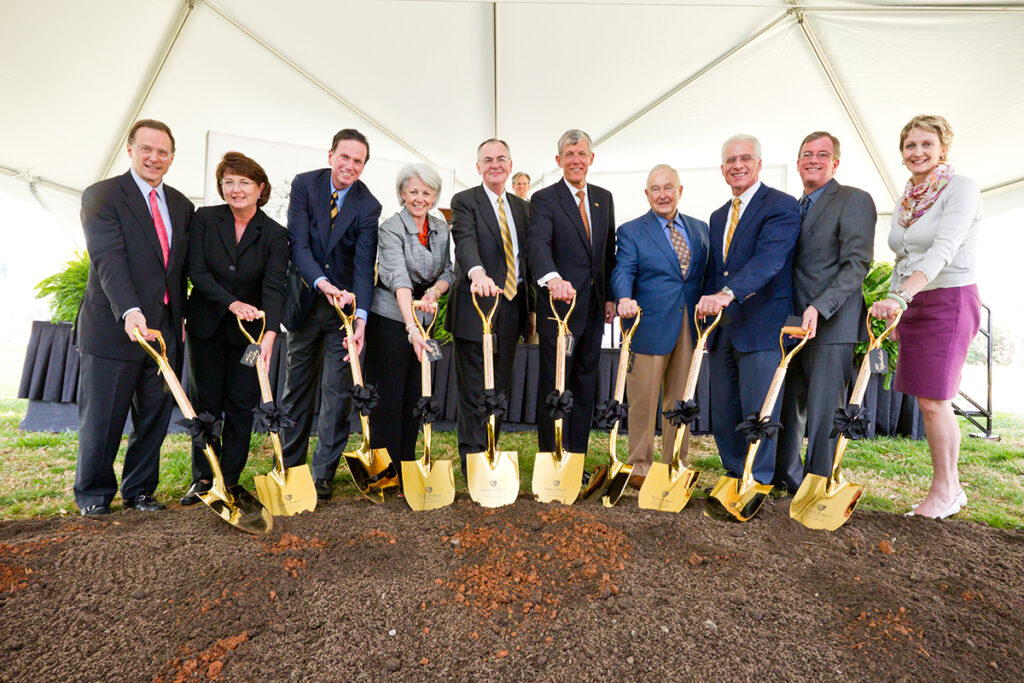
During a two-hour meeting in Mike’s Manhattan office, then-President Nathan Hatch shared about Wake Forest and its long-standing approach to education.
“What intrigued him about Wake Forest and drew him to it was not intellectual horsepower, per se, or the power of our brand, or even the raw success and prestige of our graduates,” explained Hatch in 2012. “What attracted him was the issue of character. Somehow he sensed more in our actions and commitment that this place still existed as a community that taught young people how to live, not just what to think. He was a man of principle, not of expedience. He was a man deeply committed to doing things right.”
That question of character was what drove Reinemund, also a founding donor, as he considered what businesses needed most from business schools. He repeatedly affirmed Wake Forest’s approach to business education: to help businesses and organizations create a better world by developing passionate, ethical business leaders driven to achieve results with integrity through a dynamic combination of thought leadership, rigorous academic preparation and unrivaled connection to the market.
Because of this commitment, Wake Forest draws a certain kind of business student – those who believe that accomplishment is defined by hard work, collaboration and character. And those that come to learn the essence of Pro Humanitate.
“Anyone can be in business, but it takes a person of character and integrity to be an influential leader in the business world,” said Megan Salzman Medica (MA ’83), a founding donor to Farrell Hall, along with her late husband, John Kevin Medica (MBA ’83). “Education that emphasizes integrity and results is the crux of the Wake Forest business experience, and our world needs business professionals who have been nurtured with that kind of expectation.”
Since the dedication of Farrell Hall, the faculty and leaders of the business school created the Allegacy Center for Leadership and Character. Its focus is to accelerate the development of leaders of character and to serve the greater good. They assist in integrating ethical leadership and character strengths into academic programs at the business school. And they do that while emphasizing authenticity, excellence, teamwork and practical relevance.
A decade later, Farrell Hall has seen 6,218 graduates from the business school who have been educated in an environment that has prepared them to be ready, able and honorable. That represents 30 percent of all business school graduates who earned degrees in the Winston-Salem programs.
Expectation for Excellence
For decades, Wake Forest has been among the top universities in business education. Accountancy students have earned the highest CPA pass rate for the past 20 years. Faculty are continually recognized for their expertise in the industry. And Wake Forest graduates are sought after and employed by top national companies – like Apple, Microsoft, Capital One, Deloitte, J.P. Morgan, Dish Network, KPMG, Morgan Stanley and Wells Fargo.
“Wake Forest’s solid reputation for high quality business education has never been in question,” said Susan Wiseman (’78, P ’07), a founding donor along with her husband, Trustee Eric Wiseman (‘77, MBA ’88, P ’07, LLD ’12). “It is on this cornerstone that Farrell Hall was built, and it is on this expectation that business at Wake Forest will continue to thrive.”

“At Wake Forest, Professors set high standards, collaboration with others was an expectation, and character was as important as the mastery of skills.”
– Matthew Teller (’14)
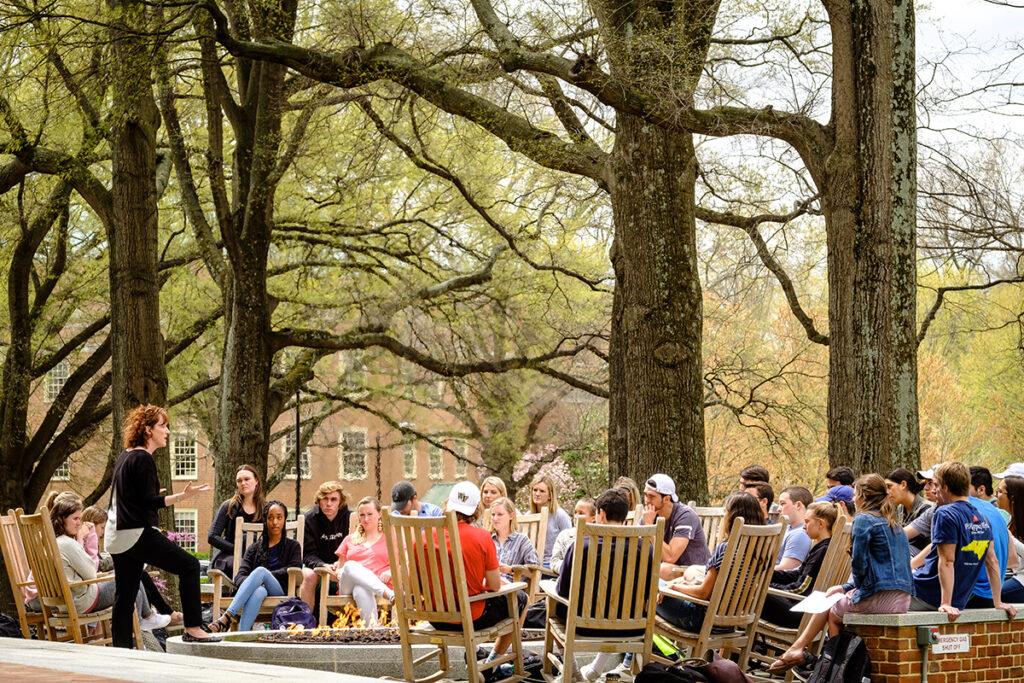
Matthew Teller (’14), a vice president at Arsenal Capital Partners and a Wake Forest University Trustee, was the business student who spoke when Farrell Hall was dedicated in November 2013. He was one of the first students to experience the business school education in the environment that was so thoughtfully developed and is still well cultivated.
“I will be forever grateful for the amazing preparation I had in my journey to becoming a business professional,” Teller said. “At Wake Forest, professors set high standards, collaboration with others was an expectation, and character was as important as the mastery of skills. It was clear once I entered the world of work that Wake Forest is unmatched in its ability to prepare business professionals.”
Within the walls of Farrell Hall are dedicated faculty who bring the business world to life. These outstanding teacher-scholars understand what it takes to succeed in the business world. They are able to translate academic theory to real-world circumstances, making sure the practical dimension is applied in the classroom. Some experts have worked for leading national and international companies; others engaged their entrepreneurial spirits and started successful companies; many serve as consultants and thinking partners for corporations.
“There is nothing more energizing than being in a classroom of inquisitive minds hungry to learn how to do business well,” said Peter Brockway (P ’09), a University Trustee and Wake Forest’s Executive in Residence, who – after a 30-plus year career in leadership roles in private equity – teaches a popular private equity class. “Sharing my knowledge with them and watching them interact in a sophisticated way with leaders in private equity who visit our classroom each year is indeed a rich reward. The interchange of ideas, collaborative thinking and scholarship is a hallmark of the Wake Forest business education, and I’m grateful to be part of it on many fronts.”
In the last decade, the School of Business has built upon this foundation of excellence and expanded its academic offerings. Joining noted programs like the master of science in management program (MSM), business education at Wake Forest now includes the master of science in business analytics (MSBA), online master of business administration (MBA), and master of science in accountancy (MSA).
As much as Farrell Hall was designed to cultivate collaboration inside the space, it has also extended a hand of partnership to those within the greater business community. That includes the Brockway Recruiting Center, which connects employers with Wake Forest students, and the various centers, which link students with the business world. The business school has built partnerships that enrich students and community entities alike, including joint efforts through the Wake Forest University Center for Private Business and the Allegacy Center for Leadership and Character.
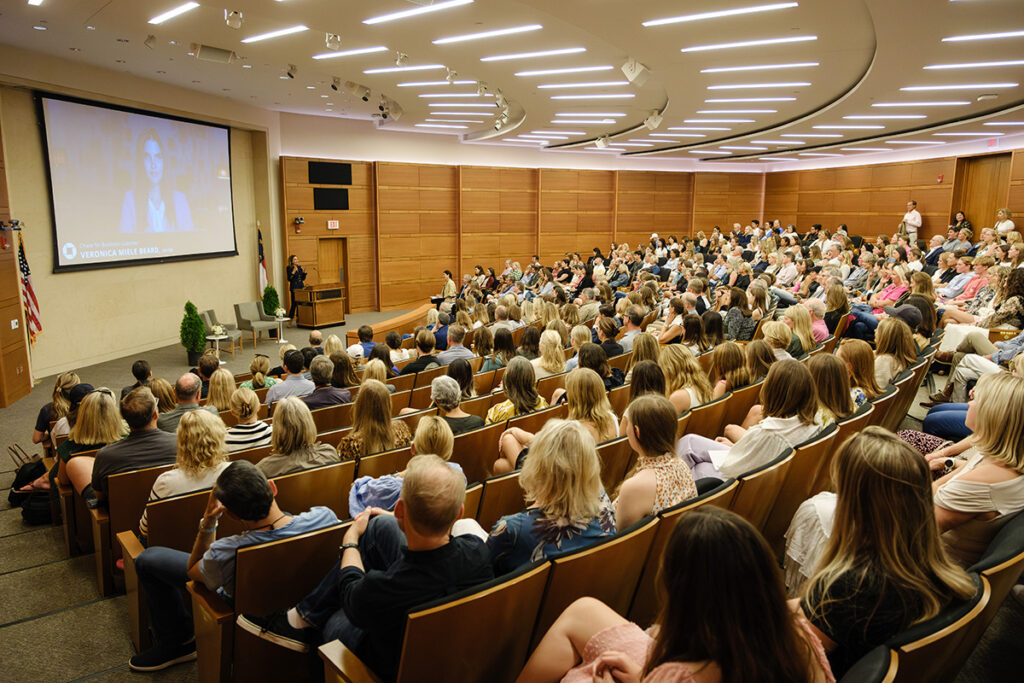
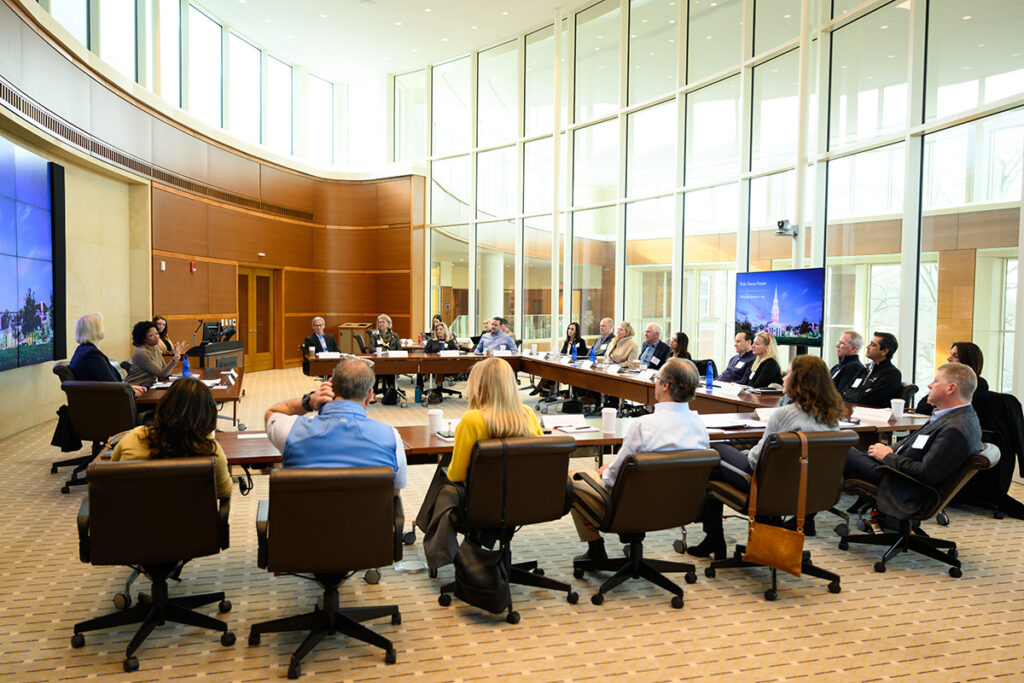
Proceed Without Fear
“It was a project so out of reach that in achieving it, our community was inspired to approach philanthropy in a new way.”
– Don Flow (MBA ’83)
“Farrell Hall taught those of us at Wake Forest to dream big,” said Don Flow (MBA ’83), University Trustee, founding donor and Winston-Salem business leader. “It was a project so out of reach that in achieving it, our community was inspired to approach philanthropy in a new way. Through this building – created for the entire campus – commitment, courage and character became the foundations on which we cultivate and care for our Wake Forest community.”
Even as the community celebrates 10 years in Farrell Hall, this year also marks the 50th anniversary of Wake Forest’s MBA program and the 75th anniversary of business education at the University. It is a convergence of milestones that underscores the longevity of this institution’s commitment to living out Pro Humanitate at home and in the world.
There is much to celebrate about the past and the foundation of business education at Wake Forest. At the same time, there is also much to anticipate about what is to come.
In July 2022, Annette Ranft was named the dean of the business school. She arrived at Wake Forest from Auburn University, where she served as dean and Wells Fargo Professor at the Harbert College of Business. Early in her career, she was a faculty member at Wake Forest and knows the community well. Ranft, a noted scholar of strategic management, brings an expertise in the acquisitions of high-tech firms, strategic leadership, merger and acquisition integration, and knowledge management.
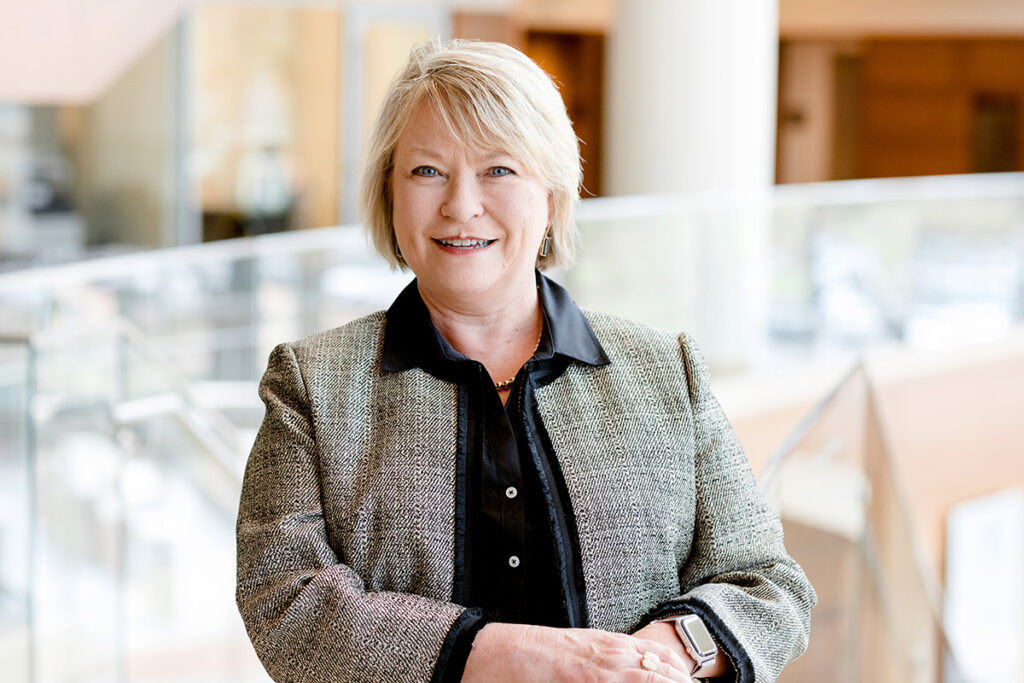
“The story of Farrell Hall is an inspiration – from the initial idea to the united support of generous donors to the education that takes place inside these halls to the graduates that leave and spread expertise in the spirit of Pro Humanitate,” said Ranft. “I am truly impressed with the strong foundation established by previous leaders at Wake Forest and in the School of Business. The investment that this community has made in business education is proof that what happens in Farrell Hall is a game-changing experience for generations. As we look ahead, we will build upon the collaboration, high standards, scholarship and community partnerships that have and will continue to define excellence in business at Wake Forest.”
Etched on the Farrell family crest are the words: Prodesse Non Nocere – proceed without fear. Buoyed by the past and inspired by the present, Wake Forest can walk with purpose toward its third century, never forgetting where it came from.
“Philanthropy built Farrell Hall and has changed how we dream at Wake Forest.”
– Mary Farrell (P ’10)
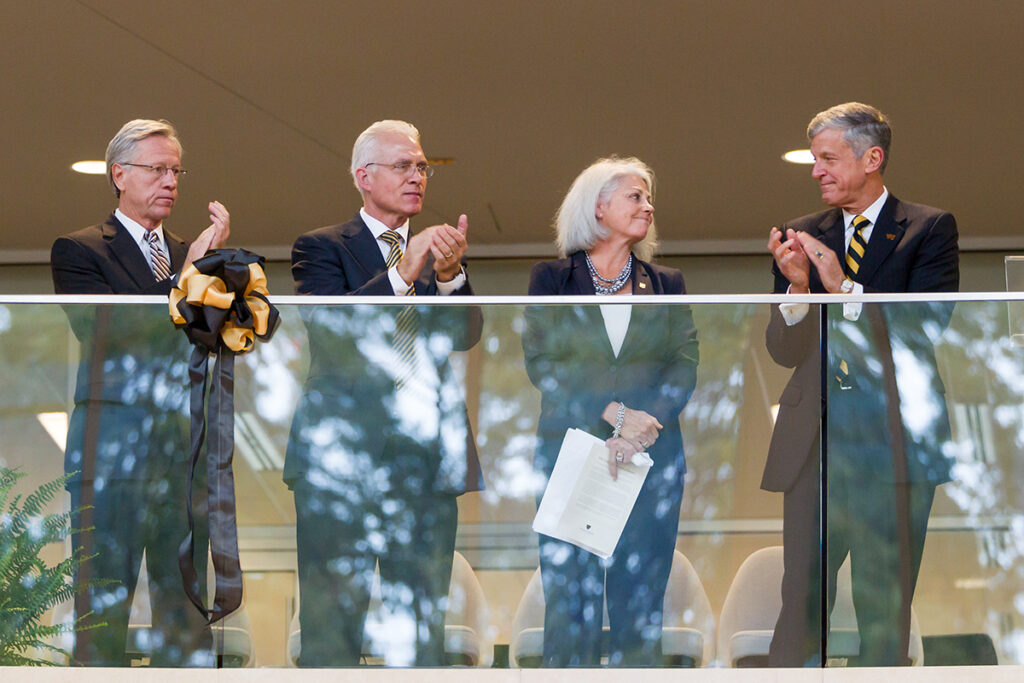
In 2012, a year before Farrell Hall was dedicated, Mike Farrell passed away. He was only 61. Though he never saw the building fully completed, he knew that because of the power of philanthropy, the vision would be realized.
“Mike would be delighted to see Farrell Hall today,” said Mary. “He would be amazed to know that what we imagined all those years ago – a place for business education, a conduit for connection and a living room for all of campus – came about in the best possible way. Philanthropy built Farrell Hall and has changed how we dream at Wake Forest.”
In the entry of Farrell Hall there is an art installation that portrays the image of Mike Farrell and his father. The building is named for Mike Farrell’s dad, a man who never felt comfortable on a college campus. It is held up by an I-beam – like the rest of the beams that support the building – but this one is signed by all of the local construction workers who invested their skills into crafting a place where future leaders could pursue their dreams and be part of bettering the world.
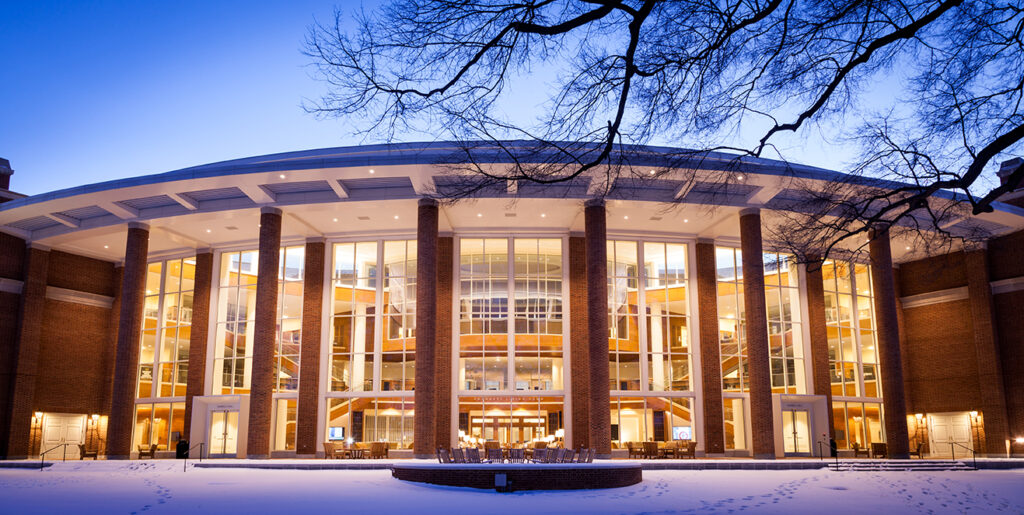
Farrell Hall was made possible by the generous philanthropy of the Founding Investors.
Michael A. (LLD ’13) and Mary Farrell (P ’10)
Charlie (MBA ’76, LLD ’12) and Candy Ergen (P ’12, P ’17)
David (MBA ’78) and Marijke Jurgens Dupree (P ’20, P ’22)
David (’77) and Lelia (’77) Farr (P ’07)
Don (MBA ’83) and Robbin Flow
John Kevin (MBA ’83) and Megan Salzman (MA ’83) Medica
Steve and Gail Reinemund
Dave (MBA ’82) and Sue Wahrhaftig (P ’18, P ’21, P ’21)
Eric (’77, MBA ’88, LLD ’12) and Susan (’78) Wiseman (P ’07)
Written by Elaine Tooley | Photography by Ken Bennett and Lyndsie Schlink
